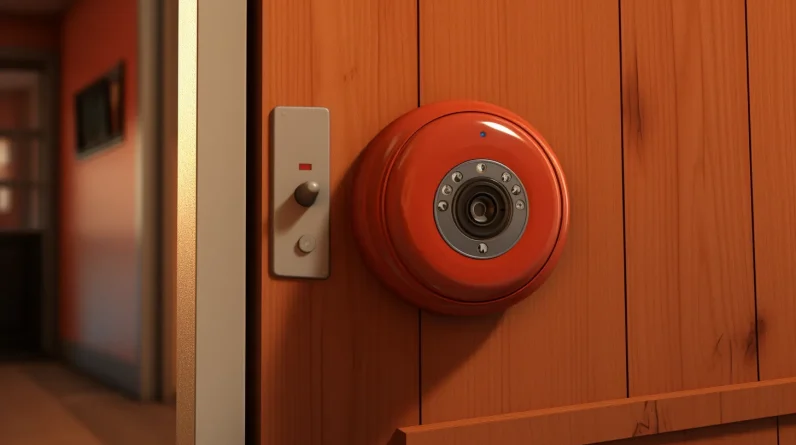
In the digital age, our homes have become increasingly connected, transforming into smart environments that enhance convenience and efficiency.
However, just as we safeguard our physical spaces, protecting our privacy within these smart homes is paramount.
Like a vigilant sentry, smart home security systems function as a shield, fortifying our personal data from potential threats.
This article delves into the significance of smart home security, explores common privacy risks, and provides best practices for securing your smart home, empowering you in your pursuit of privacy and freedom.
Key Takeaways
– Smart home security is crucial due to the advancement of technology and the growing popularity of smart home devices, which can collect and transmit personal data.
– To enhance smart home security, it is important to establish a strong network security framework, use strong and unique passwords for each device, regularly update firmware and software, and secure the Wi-Fi network with a strong password and encryption.
– Privacy in smart home devices can be protected by understanding data collection practices, disabling unnecessary features and permissions, adjusting privacy settings, and considering devices with enhanced privacy features like built-in encryption.
– In the event of a smart home security breach, it is necessary to identify the breach, disconnect compromised devices, change passwords and update software/firmware, investigate the cause of the compromise, and seek legal advice if necessary.
The Importance of Smart Home Security
As technology continues to advance, the importance of smart home security becomes increasingly evident. With the growing popularity of smart home devices and the Internet of Things (IoT), there are legitimate concerns about smart home privacy and protecting personal data.
Smart home privacy concerns arise from the fact that these devices are constantly collecting and transmitting data. From cameras and motion sensors to voice assistants and smart appliances, these devices have the ability to track our movements, monitor our behavior, and even listen to our conversations. This vast amount of personal information being collected raises questions about who has access to it and how it is being used.
Protecting personal data in the context of smart home security is crucial. Users must ensure that their devices are properly secured, with strong passwords and regular firmware updates. It is also important to carefully review the privacy policies of the devices and apps being used, as well as the permissions granted to them.
Opting for devices that offer end-to-end encryption and secure communication protocols can help safeguard personal data from potential hackers and unauthorized access. Additionally, using a virtual private network (VPN) can add an extra layer of protection when accessing smart home devices remotely.
Common Privacy Risks in Smart Homes
Users should be aware of the common privacy risks in smart homes, as they can have significant implications for personal data security. One of the major concerns is the possibility of data breaches. As smart homes become more connected and integrated with various devices, there is an increased risk of unauthorized access to personal information. Hackers can exploit vulnerabilities in the smart home network or devices to gain access to sensitive data, such as financial information or personal preferences.
Another privacy risk in smart homes is the vulnerability of voice assistants. These voice-controlled devices, such as Amazon Echo or Google Home, are constantly listening for voice commands. While this convenience is appreciated by users, it also raises concerns about the potential for eavesdropping and unauthorized data collection. There have been instances where voice recordings have been accessed by unauthorized individuals or companies, leading to privacy breaches.
To mitigate these risks, users should take measures to secure their smart homes. This includes regularly updating the firmware of smart devices, using strong and unique passwords, and implementing multi-factor authentication. Additionally, it is important to review and understand the privacy policies of smart home devices and voice assistants, as well as the data sharing practices of the companies behind them.
Best Practices for Securing Your Smart Home
The best practice for securing your smart home is to establish a strong network security framework. This framework should include robust encryption protocols to protect your smart devices and prevent unauthorized access.
Here are five key measures you can take to ensure the security of your smart home:
Implement strong and unique passwords: Use complex passwords for all your smart devices and ensure they are different for each device. Avoid using easily guessable passwords like ‘123456’ or ‘password’.
Keep your devices updated: Regularly update the firmware and software of your smart devices. Manufacturers often release security patches and updates that address vulnerabilities and enhance the security of their products.
Secure your Wi-Fi network: Set up a secure Wi-Fi network by using the latest encryption standards, such as WPA2. Change the default network name (SSID) and password to prevent unauthorized access.
Enable two-factor authentication: Enable two-factor authentication whenever possible. This adds an extra layer of security by requiring a second form of verification, such as a fingerprint scan or a unique code sent to your mobile device.
Regularly monitor your network: Use network monitoring tools to keep an eye on the traffic flowing to and from your smart devices. Look for any suspicious activity or unauthorized access attempts.
Privacy-Focused Features and Technologies for Smart Homes
Privacy-focused features and technologies offer homeowners enhanced control over their personal data and ensure the secure and private operation of their smart homes. With the increasing adoption of smart home devices, concerns about data privacy have become a significant issue for many users. To address these concerns, manufacturers are incorporating privacy-focused features and technologies into their products.
One of the key privacy-focused features is the use of encryption protocols. Encryption is the process of encoding information in a way that only authorized parties can access it. Smart home devices can use encryption protocols such as SSL/TLS to secure the communication between the devices and the cloud servers they connect to. This ensures that any data transmitted between the devices and the servers is encrypted and cannot be intercepted by unauthorized parties.
Another privacy-focused feature is the use of privacy-focused devices. These devices are designed with built-in privacy features, such as physical switches that allow users to manually disconnect the device from the network or disable certain functionalities. Privacy-focused devices also prioritize data minimization, which means they collect and store only the necessary data and do not unnecessarily transmit or share personal information.
Steps to Take if Your Smart Home Security Is Compromised
In the event that your smart home security is compromised, it is imperative to swiftly and effectively respond by taking appropriate measures to mitigate the risks and restore the integrity of your system. The recovery process should be approached with a methodical and detail-oriented mindset.
Here are five steps you should consider taking if your smart home security is compromised:
1. Identify the breach: Conduct a thorough analysis to determine the extent of the compromise. This includes identifying any unauthorized access, potential data breaches, or tampering with your smart devices.
2. Disconnect compromised devices: Isolate the affected devices from your network to prevent further damage or unauthorized access. This will help contain the breach and protect other devices connected to your smart home ecosystem.
3. Change passwords and update software: Immediately change all passwords associated with your smart home devices, network, and any related accounts. Additionally, update the software and firmware of your devices to ensure they have the latest security patches.
4. Investigate the cause: Determine how the compromise occurred. Was it due to a weak password, outdated software, or a vulnerability in a specific device? Understanding the cause will help you prevent future breaches.
5. Report the incident and seek legal advice: Depending on the severity of the breach, it may be necessary to report the incident to law enforcement authorities. Additionally, consult with a legal professional to understand the potential legal implications and to take appropriate action to protect your rights and privacy.
Taking these steps will help you recover from a smart home security breach and safeguard your privacy. Remember, being proactive in addressing the issue is crucial to minimizing the impact and preventing future incidents.
Frequently Asked Questions (FAQs)
How Can I Improve the Security of My Smart Home Devices?
Improving the security of smart home devices is crucial for protecting privacy. Various measures can be taken, such as enabling strong authentication methods, regularly updating firmware, using secure Wi-Fi networks, and implementing robust encryption protocols.
Are There Any Specific Privacy Risks Associated With Voice Assistants in Smart Homes?
Privacy concerns arise when using voice assistants in smart homes due to the potential for data collection. Voice commands are recorded and stored by these devices, raising questions about the security and privacy of personal information.
Can Hackers Gain Access to My Smart Home Devices Through My Wi-Fi Network?
Yes, hackers can potentially gain access to smart home devices through vulnerable Wi-Fi networks. To prevent unauthorized access, it is crucial to ensure strong network security measures, such as using a strong password, enabling two-factor authentication, and regularly updating firmware.
How Can I Ensure That My Smart Home Devices Are Not Collecting and Sharing My Personal Data?
To ensure that your personal data is not collected and shared by your smart home devices, it is crucial to choose manufacturers that prioritize data encryption for their devices. This ensures that your information remains secure and protected from unauthorized access.
Are There Any Legal Protections in Place to Safeguard the Privacy of Smart Home Users?
Legal implications surrounding smart home privacy and data protection are essential to safeguard the rights of users. Adequate legislation is necessary to ensure that individuals have the necessary legal protections to maintain their privacy in the era of smart home technology.
Conclusion
In conclusion, securing our smart homes is crucial in protecting our privacy. With the increasing reliance on smart devices, it is important to be aware of the common privacy risks and implement best practices to mitigate them.
Incorporating privacy-focused features and technologies can further enhance the security of our smart homes. As a staggering statistic, a survey found that 68% of smart home device owners are concerned about their privacy being compromised, highlighting the need for robust security measures.







